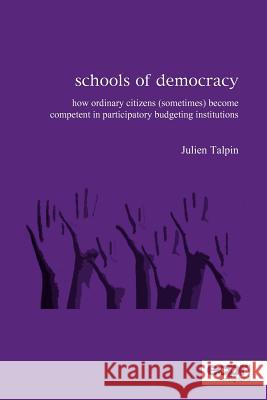Schools of Democracy: How Ordinary Citizens (Sometimes) Become Competent in Participatory Budgeting Institutions » książka
Schools of Democracy: How Ordinary Citizens (Sometimes) Become Competent in Participatory Budgeting Institutions
ISBN-13: 9781907301186 / Angielski / Miękka / 2011 / 252 str.
Schools of Democracy: How Ordinary Citizens (Sometimes) Become Competent in Participatory Budgeting Institutions
ISBN-13: 9781907301186 / Angielski / Miękka / 2011 / 252 str.
(netto: 221,96 VAT: 5%)
Najniższa cena z 30 dni: 229,89
ok. 16-18 dni roboczych.
Darmowa dostawa!
Schools of Democracy offers a vivid analysis of the long-term impact of engagement in participatory budgeting institutions in Europe. While democratic innovations mushroom nowadays around the world, great hopes have appeared on their potential to re-enchant representative government and solve the increasing apathy of the public. Based on a rich ethnographic study in France, Italy and Spain, this book shows how participatory institutions can satisfy this ambition, by creating the procedural and social conditions of formation of a competent citizenry. More than deliberation itself, it seems that the informal discussions and interactions between a diverse public allows mutual learning and the beginning of a political trajectory for people who were at first so far from the public sphere. The book also shows however, how individuals often end up disappointed by the little decision-making power they are granted, exiting the institutions ever more cynical than at the beginning. JULIEN TALPIN is research fellow in political science at the CERAPS/University of Lille. His research deals with deliberative democracy, political socialisation and the transformations of representative government. He has studied a variety of democratic innovations from citizen juries, neighbourhood councils and participatory budgeting. Using both ethnographic and socio-historical methods, he mostly focuses on the individual impact of participation and deliberation.
Schools of Democracy offers a vivid analysis of the long-term impact of engagement in participatory budgeting institutions in Europe. While democratic innovations mushroom nowadays around the world, great hopes have appeared on their potential to re-enchant representative government and solve the increasing apathy of the public. Based on a rich ethnographic study in France, Italy and Spain, this book shows how participatory institutions can satisfy this ambition, by creating the procedural and social conditions of formation of a competent citizenry. More than deliberation itself, it seems that the informal discussions and interactions between a diverse public allows mutual learning and the beginning of a political trajectory for people who were at first so far from the public sphere. The book also shows however, how individuals often end up disappointed by the little decision-making power they are granted, exiting the institutions ever more cynical than at the beginning. JULIEN TALPIN is research fellow in political science at the CERAPS/University of Lille. His research deals with deliberative democracy, political socialisation and the transformations of representative government. He has studied a variety of democratic innovations from citizen juries, neighbourhood councils and participatory budgeting. Using both ethnographic and socio-historical methods, he mostly focuses on the individual impact of participation and deliberation.











